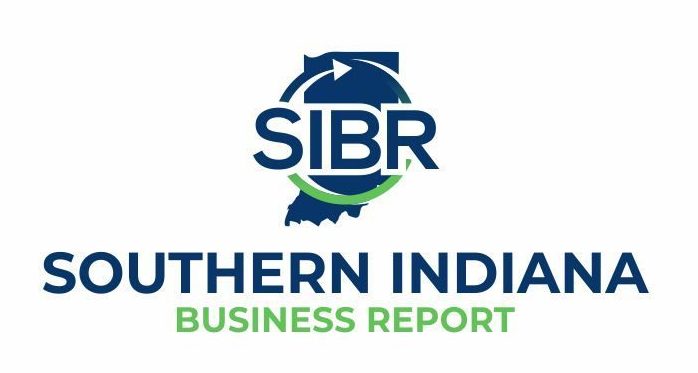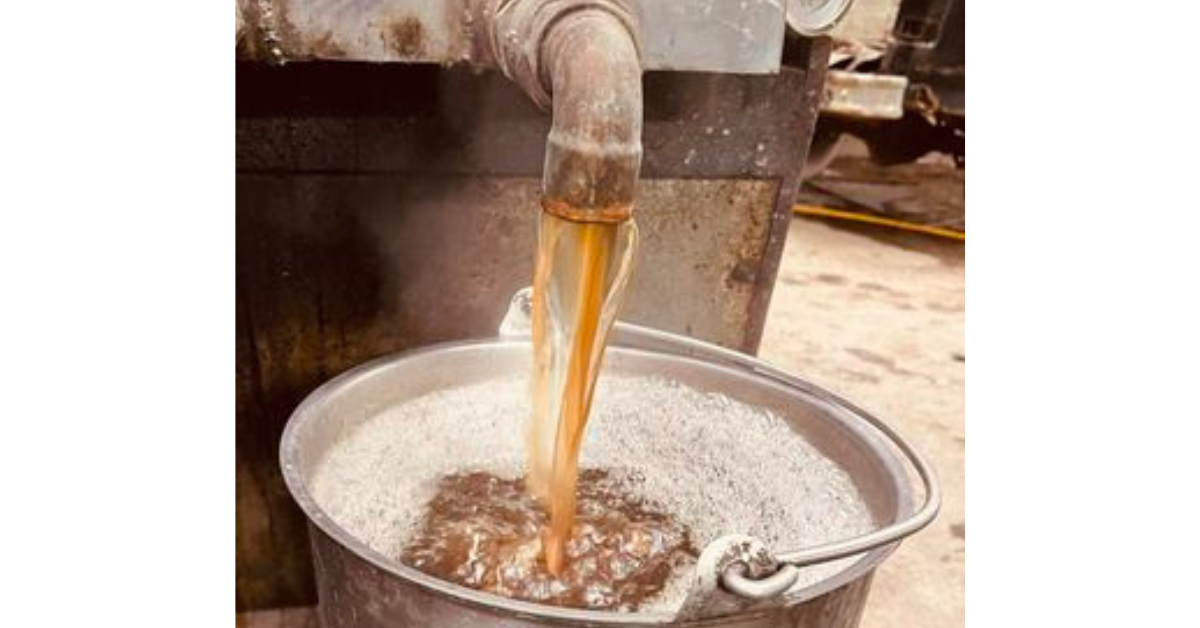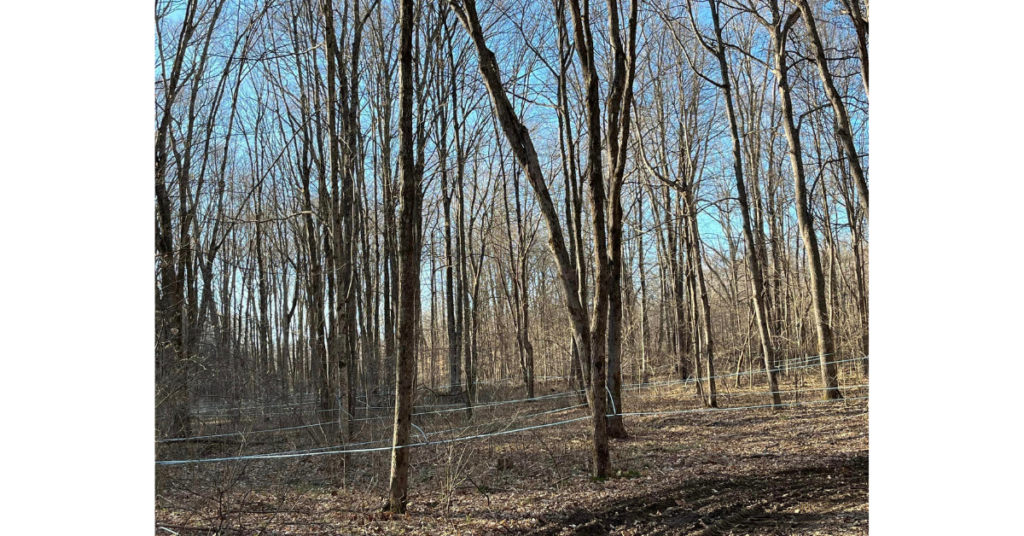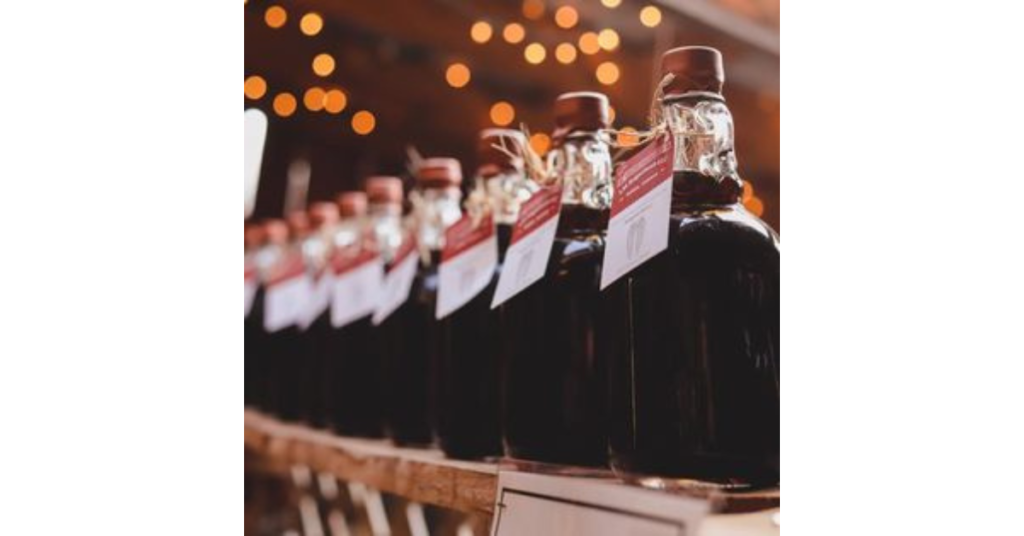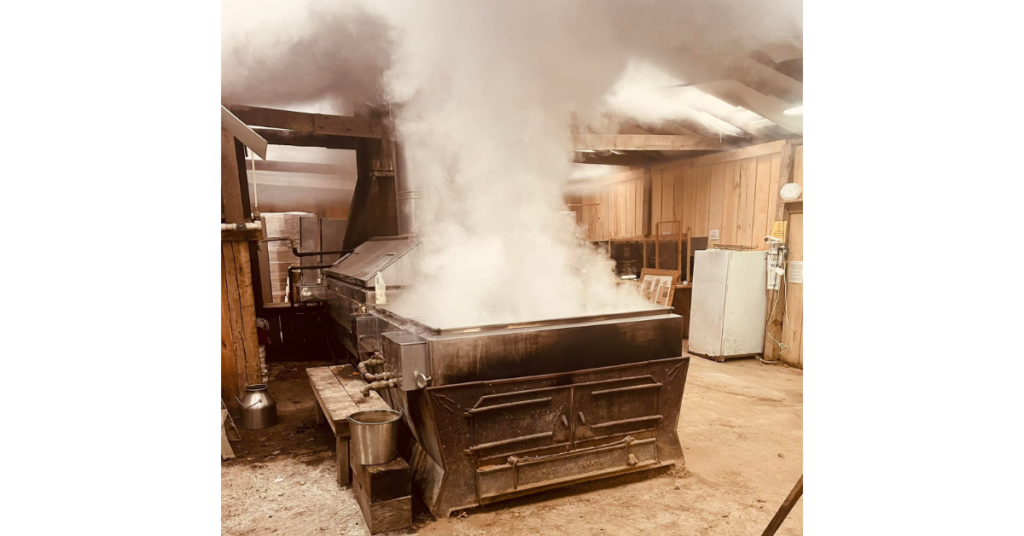LM Sugarbush near Salem sells 3,000 gallons of syrup each year
Carol Johnson, Southern Indiana Business Report
SALEM – Jennifer Reisenbichler and Emily Blackman grew up helping their parents make maple syrup on their family’s farm outside of Salem. They have fond memories of the annual maple syrup festival that draws in thousands of visitors each year.
In 2013 the sisters, along with their spouses, took over the business and have overseen not just the growth of the festival, which attracts upwards of 15,000 people, but annual maple syrup sales have increased from about $80,000 to nearing $250,000.
The 32nd annual Maple Syrup Festival runs Feb. 25-26 and March 4-5. As the families prepare to welcome thousands to their farm to see how syrup is made, Reisenbichler reflected on the past 10 years of owning LM Sugarbush.
“The first few years were a lot of blood, sweat and tears,” she said.
The sisters knew all about making syrup, but had never been involved in the business side. They discovered the business was not as profitable as they hoped it would be and spent the first three years acclimating to the demands of making syrup and getting the product in stores.
At one point, Jen and Emily and their husbands Nic Reisenbichler and Robert Blackman, discussed selling the farm and business.
“I laugh about that,” Reisenbichler said. “We’re way past the point of selling it now.”
Today, LM Sugarbush sells 3,000 gallons of syrup each year. That’s more than the 2,500 maple trees on the farm can produce so the owners partner with Amish syrup producers in the area, buying their excess.
“We didn’t have a distribution problem, we had a supply problem,” she said. “The Amish also produce pure maple syrup. They had more supply, but not a distribution channel.”
In addition to buying syrup from several Amish families, this year they will buy syrup from Groundhog Road Farms, which has been making syrup since 1880, in Lawrence County.
A hint of bourbon
From 2014-17, the co-owners focused on improving the tapping process. Using a lateral system, the sap flows from the small tubes to a larger main line tube attached to a soft vacuum that pulls sap through the system. The tapping season lasts about six weeks.
What hasn’t changed is the evaporation process.
“A lot of syrup producers use fuel-fired evaporators to reduce sap into syrup. It is less labor intensive, but we believe it tastes different,” she said. “We continue to fire our syrups with wood.”
The Amish and Groundhog Road Farms all fire their evaporators with wood.
“We continue to fire our syrups with wood and it makes a big difference,” she said.
The biggest game changer for LM Sugarbush was an experiment in 2018 with bourbon infusion.
Reisenbichler explained that a friend who runs a brewery suggested they use an empty bourbon barrel to age a batch of syrup. The result was a syrup with a mild bourbon flavor and no alcohol content.
The first year of the bourbon maple syrup, annual sales jumped to $150,000.
“We never imagined it would take off like this,” she said.
Maple syrup in Indiana
One hundred years ago, Indiana, heavily forested with maple trees, was the nation’s number one maple syrup producer. Decades of removing trees, however, pushed the state to the bottom in scale of production.
Indiana Maple Syrup Association President Kevin Hart explained there were no large syrup producers in the state back then, rather there was an abundance of small farms that made syrup to make money during the winter.
Efforts to improve production are starting to move the needle. With more farmers finding it easier to make syrup, Indiana’s production has increased. In 2020 its production accounted for only 0.6% of USA production, about 24,000 gallons, but those numbers were a 20% increase from 2019.
Purdue University Extension is using a $500,000 Acer Access and Development grant to increase consumption and production of maple syrup in the state over a three-year span.
The state has a long way to go. Vermont, the top producer of maple syrup, produced 2.5 million gallons in 2022.
Indiana Maple Syrup Weekend in March 11-12. More than a dozen sugar shacks will be open to visitors. For more information, visit https://indianamapleweekend.com/indiana-sugar-camps/
Re-investing in Sugarbush
Each year, even as sales have grown, the partners re-invest every penny back in the farm.
They have purchased tractors, a wood splitter and renovated the old farmhouse and other buildings on the property. They recently purchased a new bottling unit.
After a decade of ownership, the four partners, who all work day jobs in the financial sector, have never paid themselves.
After years of working hard and focusing on quality, Reisenbichler said it’s interesting to be in a place of profitability.
“It’s almost harder when we make money,” she said. “We’re close to the point where we can enjoy what we’ve built and just make syrup.”
Festival growth
Now 38, Jen said she and Emily, 35, look back fondly at how the festival started as a fundraiser for their church and was small enough that one year the pancake breakfast was moved into their house because of weather.
The festival covers will feature up to 50 vendors of homemade or lightly produced items such as pottery, metal art, knives and wind chimes. There will be food trucks, wineries, several games for kids, a cowboy shootout and live music, including a dulcimer group of 80-year-olds.
When the weather cooperates, the crowds balloon.
“It’s like having five weddings on the same day at the same time,” she joked.
In general, Reisenblicher said if you want a less crowded experience, pick a day when it’s cool or drizzly.
Many visitors come for breakfast and stay for lunch because there is so much to do.
The festival draws heavily from Louisville and Indianapolis and appeals to all ages.
“It’s one of the few places left where you can bring the whole family and you won’t have your phone out all day because phones won’t work well out there,” she said with a laugh.
“People connect with the farm in an interesting way. It’s a lot about syrup, but it’s also a whole day away from screens and technology,” she said. “We’ve worked hard to keep it affordable, there’s no admission or parking fees.
“I think people are interested in the syrup process because people are so disconnected from their food.”
Their parents never intended to start a maple syrup business and festival when they bought the 140-acre farm in the 1970s. Their dad was a graduate of Rose-Hulman Institute of Technology and worked as an engineer. A friend from college visited the farm of Michael and Leane and suggested they could make their own syrup from the hundreds of maple trees on the farm.
“My dad loved nature and had always wanted to start a business,” Reisenblicher said.
Their mom, Leane Whitaker still helps out at the festival each year. “She loves seeing all the progress and how we have built on to what they created,” Reisenbichler said.
If you go
The Maple Syrup Festival is Feb. 25-26 and March 4-5 from 9 a.m. to 5 p.m. (Busiest times are from 11 a.m. to 2 p.m.) Admission and parking are free.
Visitors should dress for being outdoors and wear sturdy shoes suitable for walking. Waterproof boots are recommended. Parking areas are often muddy; visitors are urged to drive a 4WD vehicle or vehicle that can handle driving in a grassy/muddy field.
The festival is also a fundraiser for Grace Lutheran Church in New Albany. Church members serve the food.
The farm is east of Salem. Directions can be found on the LM Sugarbush website. If using GPS, the address is 321 N. Garrison Hollow Road, Salem, 47167

